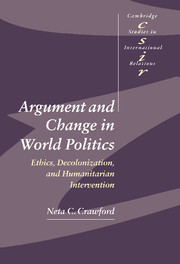Book contents
- Frontmatter
- Contents
- List of illustrations
- List of tables
- Acknowledgments
- Introduction
- 1 Argument, belief, and culture
- 2 Ethical argument and argument analysis
- 3 Colonial arguments
- 4 Decolonizing bodies: ending slavery and denormalizing forced labor
- 5 Faces of humanitarianism, rivers of blood
- 6 Sacred trust
- 7 Self-determination
- 8 Alternative explanations, counterfactuals, and causation
- 9 Poiesis and praxis: toward ethical world politics
- Appendix. African decolonization
- Select Bibliography
- Index
- CAMBRIDGE STUDIES IN INTERNATIONAL RELATIONS
Introduction
Published online by Cambridge University Press: 22 September 2009
- Frontmatter
- Contents
- List of illustrations
- List of tables
- Acknowledgments
- Introduction
- 1 Argument, belief, and culture
- 2 Ethical argument and argument analysis
- 3 Colonial arguments
- 4 Decolonizing bodies: ending slavery and denormalizing forced labor
- 5 Faces of humanitarianism, rivers of blood
- 6 Sacred trust
- 7 Self-determination
- 8 Alternative explanations, counterfactuals, and causation
- 9 Poiesis and praxis: toward ethical world politics
- Appendix. African decolonization
- Select Bibliography
- Index
- CAMBRIDGE STUDIES IN INTERNATIONAL RELATIONS
Summary
This book follows three lines of inquiry, each equally important. First, it proposes a new theory of argument and change in world politics, focusing in particular on the role of ethical argument and normative change. Second, it intervenes in an older academic dispute, the problem of why colonialism ended. Third, in the prescriptive voice of international political theory and ethics, it suggests how, building on the practices of ethical argument that are already in place, certain practices of international relations might be used to make world politics more just and peaceful.
Why focus on argument and change? International relations theorists have two generic social conditions to explain: order and change. Scholars have done well at explaining more stable aspects of world orders, such as bi-polar and multi-polar systems, but much less well at explaining, or more ambitiously, predicting significant changes in world political and economic relations. Of course accounting for stability, equilibrium, and change is no easy task and probably no single variable can do all or even most of the explanatory work. But that has not stopped international relations theorists from proposing master variable accounts of world politics – for example, stressing the drive for power or the operation of markets.
International relations theory has difficulty accounting for change in part because it has thus far not developed a clear understanding of process. The world is ordered or it changes; stasis or rupture. This view is a consequence of our meta-theoretical building blocks.
- Type
- Chapter
- Information
- Argument and Change in World PoliticsEthics, Decolonization, and Humanitarian Intervention, pp. 1 - 10Publisher: Cambridge University PressPrint publication year: 2002
- 1
- Cited by

